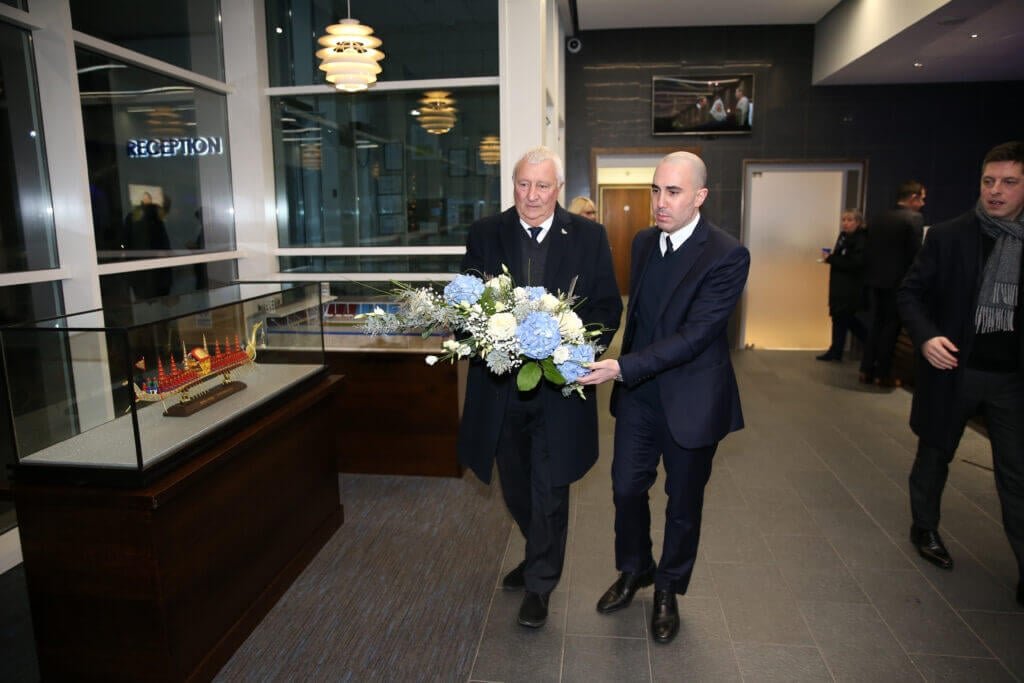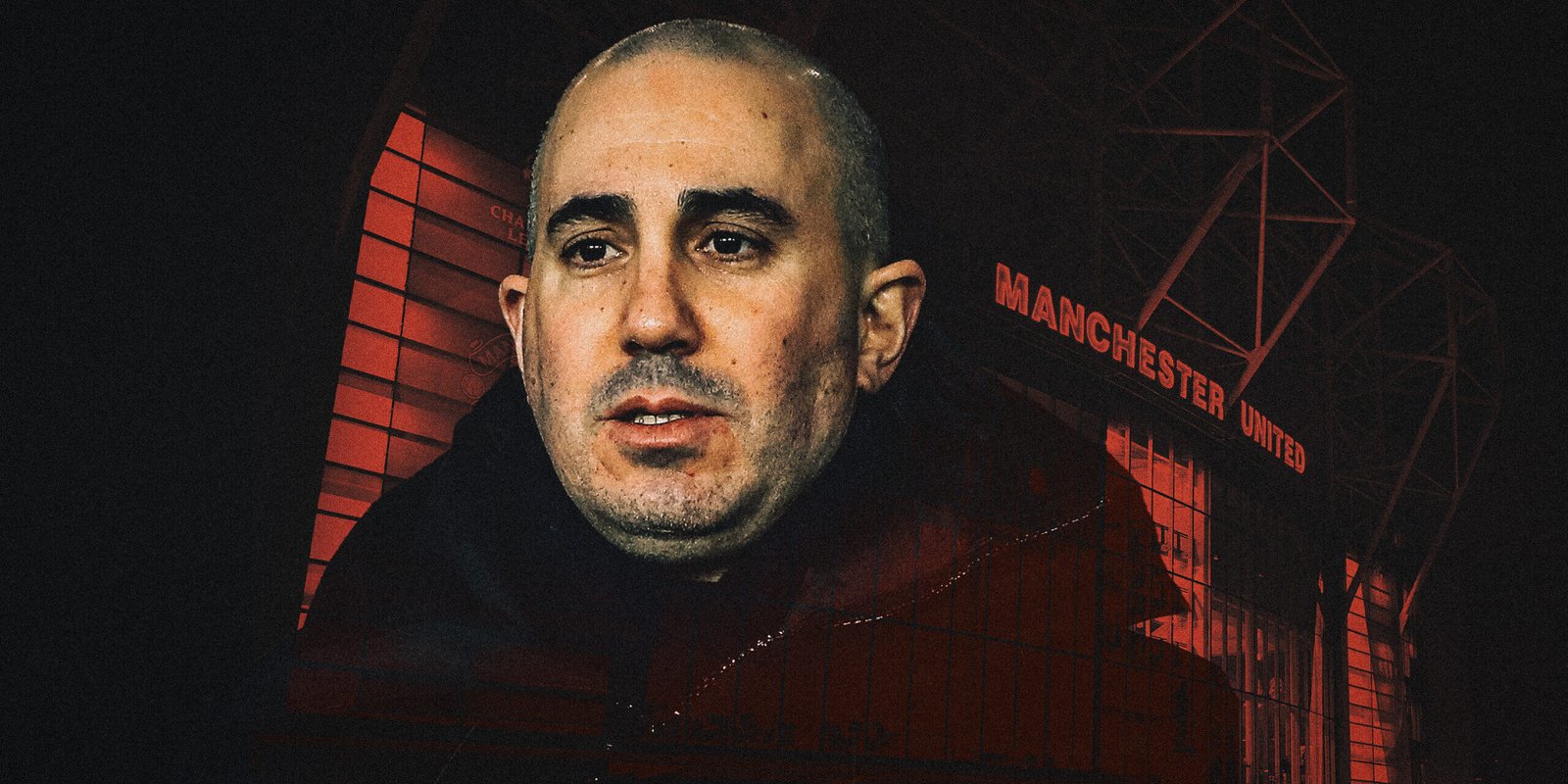Arguably the most sensational off-the-pitch coup in Manchester football’s recent memory began back in December, when Dave Brailsford was busy canvassing the opinions of those within the industry and asking who they thought would make a good chief executive.
There was a name that came up regularly: Omar Berrada.
It is safe to assume this was not a new name to Brailsford, who was familiar with the Manchester scene through his sporting background, but those conversations came with glowing endorsements that were difficult to ignore.
Word reached Brailsford that Berrada would only leave his role as Manchester City’s chief football operations officer for a huge club — at the level of Real Madrid or, say, Manchester United. And so he thought it was worth asking.
The approach was made, a meeting was arranged and Brailsford left his encounter with Berrada impressed. Further meetings followed with Sir Jim Ratcliffe but the key, final get-together came in Monaco between Berrada, Brailsford, Ratcliffe and — importantly — Joel and Avram Glazer.
As The Athletic exclusively reported when breaking the news of his appointment on Saturday evening, Berrada was identified, pursued and ultimately persuaded to leave City by INEOS, United’s new minority owners with powers of sporting control.
Yet as the final say on a decision of this magnitude would always rest with the majority shareholders, Berrada was still required to impress the Glazers.
Over almost 19 years of their ownership, the Glazers have typically been happy to take advice on football matters. That they should allow INEOS to take the lead on this appointment, even before its 25 per cent investment received Premier League ratification, was hardly out of character.
But sources with knowledge of the situation, who asked to remain anonymous as they did not have permission to speak, describe the final decision as a genuinely collective one, with Berrada not simply presented to the Glazers as a fait accompli to be signed off. All parties recognised that the chief executive role is the most important appointment the club can make.
Joel and Avram Glazer (Oli Scarff/AFP via Getty Images)
Equally, no prospective chief executive would wish to take a job in which two sets of owners are not pulling in the same direction. And so it was only after the Glazers meeting with Berrada, with Ratcliffe and Brailsford’s recommendations in tow, that all parties agreed to the appointment.
What was out of character was how unusually discreet it all was. Sources with knowledge of the deal say secrecy was paramount in getting it over the line.
One person in the presence of Ratcliffe during his Manchester visit last week did detect the impending announcement of something major, due to the British billionaire’s rhetoric about driving change quickly at the club, but not that it would be a new chief executive so soon or his identity.
United’s approach was so discreet, in fact, that senior figures at Old Trafford did not know about it until learning the story was about to be broken by The Athletic on Saturday afternoon, after which an emergency leadership meeting was called.
United’s communications department also had to rush into action and prepare statements announcing Berrada’s imminent hiring. United would ideally have revealed the news on their own terms this week, with Wednesday pencilled in for an official announcement.
Instead, everything had to be pushed forward. This accelerated process meant United were not able to trawl through Berrada’s social media accounts as planned and flag the historic United-related tweets that quickly came to light.


Although Berrada wondering whether Bayern Munich deserved to win the 1999 Champions League final caused a brief commotion online, sources say those involved in the process could hardly care less.
Of far more importance was United’s statement confirming Berrada’s appointment, released at 9.30pm on Saturday evening, with the second paragraph insisting that the club is “determined to put football and performance on the pitch back at the heart of everything we do”.
Although notable for the tacit admission that football has perhaps not always been at the heart of everything United do, the statement was signed off by Joel Glazer and the same words were subsequently sent to club staff in an internal email under his name.
The significance of that admission from a Glazer sibling, combined with the appointment of a football-focused chief executive Berrada, as much as any other development since Ratcliffe’s minority investment was confirmed last month, has not been lost on many within the club.
To them, the weekend’s events were a precursor to something reiterated by interim chief executive Patrick Stewart in an all-staff meeting held on Wednesday — that the transition into the INEOS era at Old Trafford is about far more than simply taking control of football operations.
There were just as many shockwaves on the other side of Manchester and in Abu Dhabi. Many at City’s warm-weather training camp in the United Arab Emirates were also unaware of Berrada’s decision until the news broke publicly. Players and coaching staff were shocked to learn he was leaving for Old Trafford.
Some at City knew what was coming. Pep Guardiola and chief executive Ferran Soriano were both aware, having been informed of Berrada’s final decision last week. Director of football Txiki Begiristain was in Girona rather than Abu Dhabi last weekend, but had also been briefed and knew what to expect.
Generally, though, there were next to no suspicions that Berrada was about to jump ship among staff.

(Matthew Ashton – AMA/Getty Images)
As part of his duties as chief football operations officer, Berrada was only recently involved in City’s negotiations with River Plate for young talent Claudio Echeverri, working long, hard and successfully on a challenging deal, without ever hinting that it would be one of his last.
Berrada did not travel to Abu Dhabi for City’s training camp and is now serving six months of gardening leave, meaning he is not expected to start work formally at United until the summer.
Despite crossing the divide, a bitter, spiteful exit was always considered unlikely given how well-respected he was and continues to be at the Etihad. That respect runs both ways. Berrada was flattered by United’s approach but is still said to have agonised over the decision, telling one friend it “was the toughest he’s ever had to make in his life”.
After years working at Soriano’s right hand and alongside Begiristain, he knows full well he is leaving arguably the most successful club in world football at present and walking into a very different organisation that has spent the past decade a long way off City’s level.
Why do it, then? The opportunity to be a chief executive is a key motivation. Some who know Berrada doubt he would have left City in a sideways move, for a role equivalent to his current position, but a promotion and the chance to call the shots was too good to turn down.
But equally, United’s size, stature and historic success are also an important part of the equation. Multiple sources who, like others in this article spoke on condition of anonymity to protect their positions, believe Berrada’s decision demonstrates Old Trafford’s indelible pull, even after so many years of underachievement.
The allure of restoring United to former glories, as part of a new internal structure with sporting pedigree, is a difficult proposal to turn down.
Some who have worked closely with Berrada believe INEOS’ track record across multiple sporting disciplines may also have appealed, not least OGC Nice’s impressive showing in Ligue 1 this season under bright young head coach Francesco Farioli.
Defections of this magnitude in football tend to involve a good degree of animosity but, in the wake of the news, City’s stance was calm and collected. A statement confirming Berrada’s resignation said the club “understands his decision to look for a new challenge” and that he leaves with their “thanks and best wishes”.
While City were sad to see him go, they are confident that a 130-person-strong football operations department with different layers of management led by Soriano, Begiristain and Brian Marwood, City Football Group’s managing director of global football, can absorb the shock of his exit.
That attitude is reflected by figures within the club, who believe everything will continue working as normal while Berrada’s replacement is found.
Privately, there is at least some disappointment among City executives that of all the places to go, Berrada’s next destination should be Old Trafford. There was always a sense Berrada could be poached given how well-regarded he is. For some, that he should choose United as his next step has stung a little.
Overwhelmingly, though, his former colleagues understand that they cannot begrudge him for seizing this opportunity with both hands and his decision has not damaged relationships. Some already have tentative plans to meet up with Berrada again in the future, although football talk will understandably be off-limits.
Outside of Old Trafford and the Etihad, there is an appreciation for both Berrada’s work at City and for United’s success in snatching him from their rivals.
A senior figure at one Premier League club described the appointment as the first genuinely elite move that United have made in a decade. Another industry source believes it is the best signing at Old Trafford since a teenage Cristiano Ronaldo.
Others expect Berrada will improve United’s operation in every department, in a role which is set to assume executive leadership over both the football and business sides of the club.
Some who have worked with him acknowledge a difference between being a chief operating officer (COO) — even one with football-related responsibilities, as Berrada had at City — and a chief executive.
“He will be in the eye, having to make final decisions,” says a person close to City’s hierarchy, who asked to remain anonymous to protect relationships. “When you are the COO, or in a similar role, you can talk more freely because you know it won’t be you delivering the final decision. Because United are so in the spotlight and evidently need fixing, he has taken on a huge task.”

(Plumb Images/Leicester City FC via Getty Images)
Berrada will undoubtedly be subjected to more scrutiny in his new, more senior role but there is little doubt within the industry that he can make the step up.
The only rumblings of concern and discontent to be heard are those over any potential implication of Berrada in the more than 100 charges levelled against City alleging breaches of the Premier League’s financial rules.
Berrada joined City in 2011 as head of international business development, then became director of partnerships two years later and began working closely with Soriano. In 2016, he was promoted to COO, a role which was later adapted to include more football-related responsibilities.
Berrada is not mentioned in the leaked emails published by German magazine Der Spiegel, which led to City receiving a two-year ban from the Champions League for breaching financial fair play rules in 2020. Berrada was not called as a witness to the Court of Arbitration for Sport hearing that overturned City’s punishment later that year either.
The Premier League charges against City alleging misreporting of financial information cover seasons 2009-10 to 2017-18, which includes Berrada’s first seven years at the Etihad. City deny any wrongdoing.
At the all-staff meeting on Wednesday, Stewart was challenged on Berrada’s potential implication in City’s Premier League charges. United have conducted due diligence on Berrada and are confident in his appointment.
That major question mark aside, they have reason to be. INEOS views Berrada as ticking the boxes nobody else does, with very few chief executives having his level of football-related experience working on negotiations and operations, and at the same time having won everything there is to win.
Priorities are now expected to shift to sporting director and head of recruitment roles. Sources say United’s approach is not about copying City, but believe hiring select people from a winning organisation can bring immediate benefits.
Berrada played a considerable role in tipping Manchester’s power balance one way over the past decade. Now, his task is to tip it back again.
Additional reporting by Adam Crafton and Dan Sheldon
(Top photo: Getty Images; design: Eamonn Dalton)
Read the full article here


